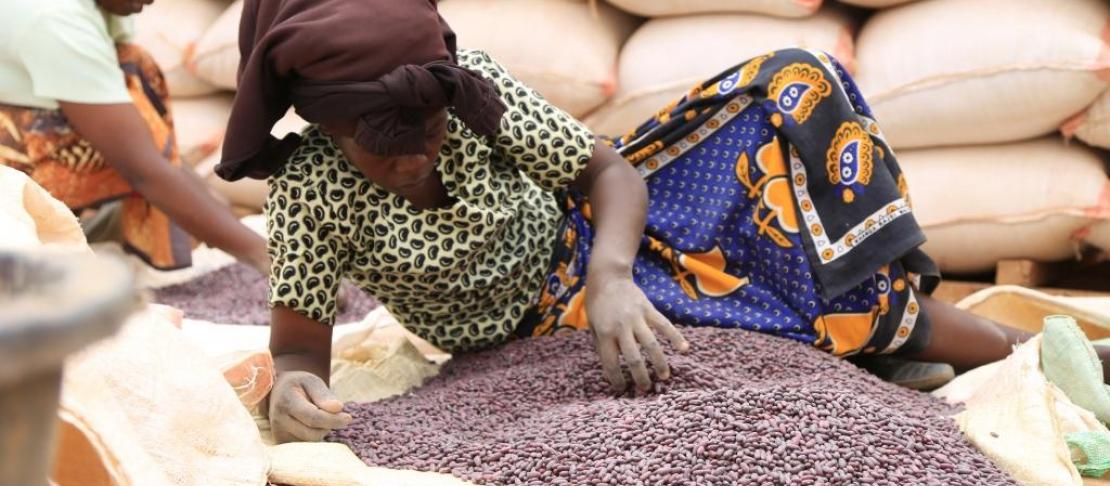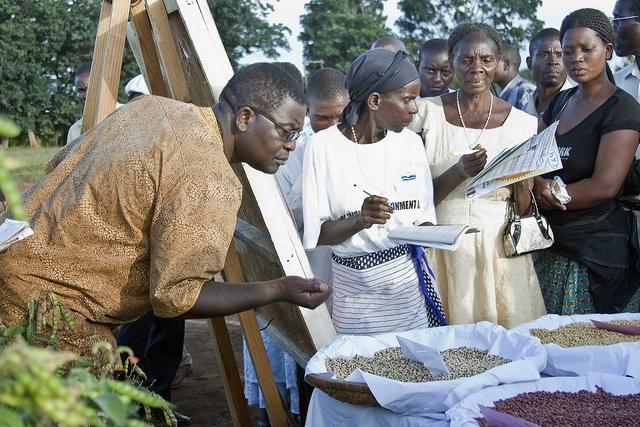Better bean varieties for Usambara’s rural poor

Farmers in Lushoto, Tanzania are now able to access improved bean varieties better suited for the area. Combined with good agronomic practices, they reported a threefold increase in bean yield compared to local varieties.
An ongoing project in Lushoto district, Tanzania aims to enhance food crop productivity through promoting the use of drought tolerant bean varieties and supporting farmers with improved agronomic practices.
The project is supported by the CGIAR research program on Climate Change, Agriculture and Food Security (CCAFS), Selian Agricultural Research Institute (SARI), farmers in Lushoto, Ministry of Agriculture among other stakeholders. By undertaking participatory action research, current efforts are directed towards making available seeds of improved varieties of beans to the farmers in this densely populated northeastern region of Tanzania’s Usambara highlands thereby establishing a sustainable seed delivery system.
Studies project vast areas of sub Saharan Africa, especially Eastern Africa, will experience a loss in suitability for bean production. This is significant as a large proportion of Africans diet comprises cereals, roots and tubers. Appropriate adaptation measures are therefore needed to ensure food security is achieved in Sub Saharan Africa in the coming years.
Learn more: Case studies: Crop adaptation to climate change – Beans
CCAFS Climate Smart Villages
Lushoto is one of CCAFS Climate Smart Villages, sites where researchers, development partners, and farmers are testing climate-smart agricultural interventions. The aim is to boost farmers’ ability to adapt to climate change, manage risks and build resilience. At the same time, the hope is also to improve livelihoods and incomes and, where possible, reduce greenhouse gas emissions to ensure solutions are sustainable.
According to a baseline survey conducted at the site, only 4% of the farmers are food secure all year long. Farmers in Lushoto, Tanzania have been growing mainly local varieties of crops whose productivity is low compared to the improved ones. This was attributed to lack of adequate access to seeds of improved varieties and inadequate knowledge on good agronomic practices.

Farmer field days are important for learning among local communities. Photo: S. Sridharan (ICRISAT)
Bean yield following growing seasons
During the first season 1,000 kilograms of improved bean seed (Lyamungo 90) were distributed to 100 baseline farmers in the zone. Farmers reported that the crop had good vigor and was relatively resistant to pests and diseases when compared to local varieties that were previously grown. This translated to a threefold increase in bean yield compared to local varieties. An estimate of 5600kgs of beans was harvested by the 100 farmers.
An estimated 800 kg of improved bean was further distributed informally to farmers with a further 500 kgs contributed to seed banks in the villages for redistribution to other farmers thus increasing adoption rates.
In the second season, another improved bean variety (Selian97) was introduced alongside the (Lyumingo90).Monitoring results showed that over 70% of the farmers used improved varieties with a further increase in yields. An estimate of 20,000kgs of improved bean varieties was harvested by 220 farmers surveyed from the five participating villages. There was however no significant yield difference between Selian 97 and Lyumingo 90. Irrespective of this, farmers preferred Selian97 for a number of reasons among them taste, color, cooking time and uniformity in maturity.
Community Based Organizations established at the study site provided a platform for distribution of the improved seeds through village banking. An estimated 300 kgs of improved bean variety was contributed to the seed bank per village for redistribution.
Improved agronomic practices taken up by farmers also led to higher bean yield. This entailed row planting as opposed to broadcasting, correct spacing, and disease and pest control. Improved income levels as a result of higher yields led to improved housing for the farmers. Over 80% got enough money to pay school fees to their children in secondary and tertiary institutions. Finally, access to improved seed meant farmers were able to increase and diversify the scale of crop production leading to improved household food security.
Learn more about a similar project: Searching for better bean varieties in Uganda
Project sustainability strategies
Income generated from the sale of the multiplied quality seeds was re - invested in the production cycle. Further to this, privately registered seed companies/farmer groups/Community Based Organizations were encouraged to continue scaling up production and supply of quality seeds. Through SARI, follow up and monitoring, institutional building, technical support and guidance will be continued and scaled up to ensure farmers are able to attain food security and improved incomes.
As demand for quality seeds in the region increases, scale out of this intervention to the entire district and beyond are a key consideration. Farmer field days will be organized to spread the innovation and promote learning among neighboring communities. This will lead to greater adoption rates in newer areas as well as engagement with agro-input dealers in the zone to market the yield produced.
Additional reading: Breeding climate-proof beans to protect the "Poor Man's Protein"
Phillip Kimeli is a Research Assistant with CCAFS. Charles Lyamchai is a Project Coordinator while George Sayula is the Lushoto site Team Leader, both work for Selian Agricultural Research Institute (SARI).The blog was edited by Vivian Atakos, Communications Specialist for CCAFS East Africa.
